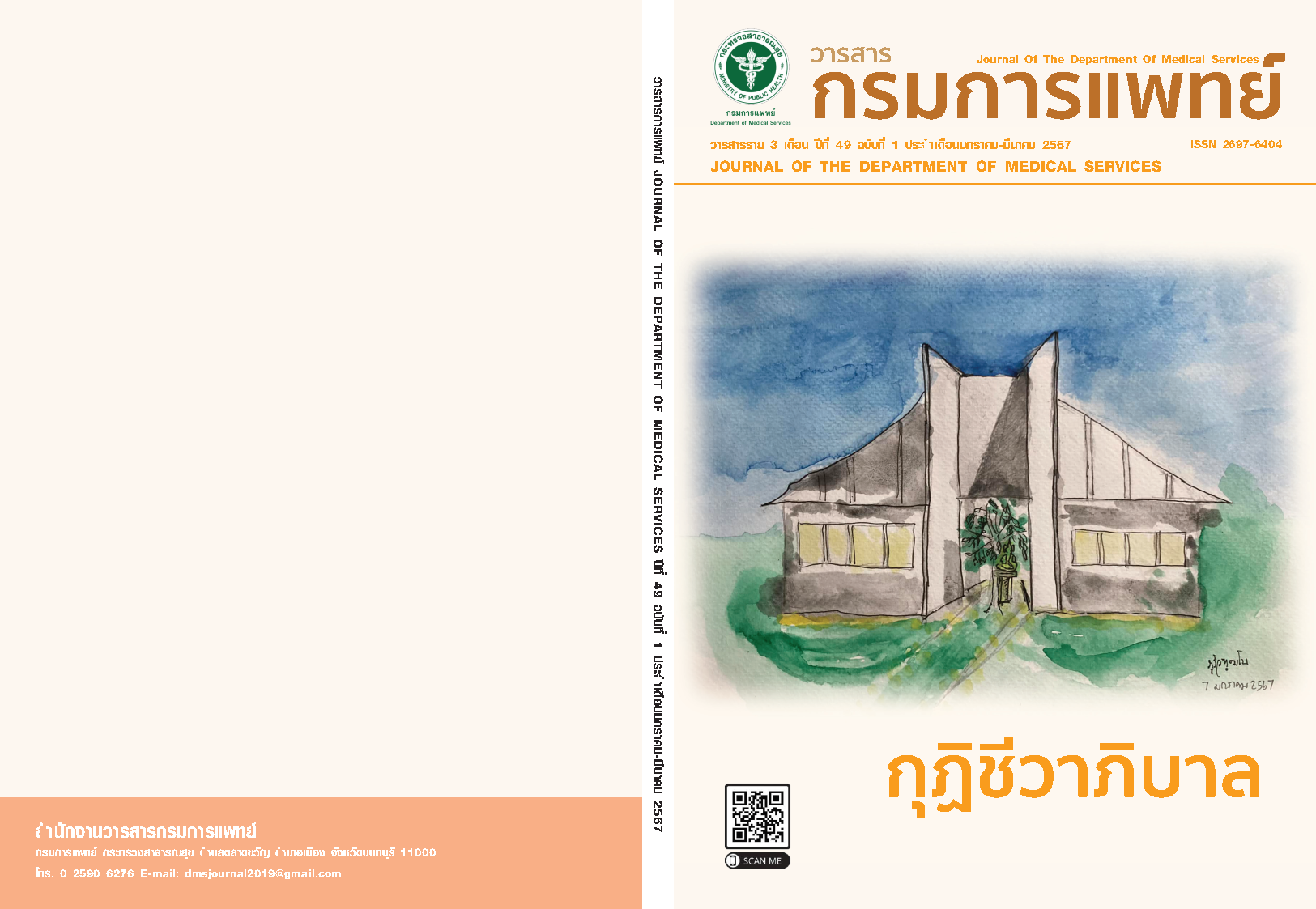Value of Digital Breast Tomosynthesis-guided Vacuum-assisted Biopsy (DBT-VAB) in Diagnosis and Management of Suspicious Non-mass Microcalcifications of Breast: An Experience of Lop Buri Cancer Hospital
Keywords:
Early breast cancer, DBT-VAB, Suspicious calcifications, Pathologic upgrade rateAbstract
Background: DBT-VAB is an alternative to surgical biopsy for early breast cancer detection when presented as calcifications without a mass. However, there is a possibility of pathologic underestimation. Objective: To evaluate malignancy rate and pathologic upgrade rate in suspicious calcifications via DBT-VAB. Method: A retrospective analysis of 98 patients (104 DBT-VAB procedures) was performed. Surgical pathology served as the gold standard for high-risk and malignant groups, with a 1-year follow-up for the benign group. The median follow-up was 51 months. Result: Malignancy rate: 29.8%, total upgrade rate: 21%. Breast MRI and MRI-guided biopsy detected one false negative. Final malignancy rates: BIRADS 4B: 27%, 4C: 56%, 5: 100%. Fine linear calcifications showed a malignancy rate of 70%, while linear and segmental distributions had rates of 100% and 60% respectively. Malignancy rates for calcifications related to BIRADS 3 follow-up, increasing calcifications, new calcifications, stable calcifications: 25%, 40%, 44%, 33% respectively. One-third of developing calcifications in benign background were malignant. Success rate: 98%, complications: small hematomas (15.3%), vasovagal reactions (2%), marker migration (24.4%). Conclusion: DBTVAB is a safe, minimally invasive, and accurate tool for diagnosing and planning the management of suspicious calcifications without masses, with a relatively low pathologic upgrade rate. High-risk and malignant lesions require surgery, while benign results enable reliable follow-up.
References
Park M, Sohn YM. Vacuum assisted-biopsy and mammo-guided localization and excisional biopsy in the microcalcifications sampling of breast: an experience of single institution. Iran J Radiol 2017;14(1):1-8.
Esen G, Tutar B, Uras C, Calay Z, İnce Ü, Tutar O. Vacumm-assisted stereotactic breast biopsy in the diagnosis and management of suspicious microcalcifications. Diagn Interv Radiol 2016;22(4): 326-33.
López-Ruiz JA, Sánchez-González M, Aguirre Larracoechea U, Zabalza-Estévez I, BasarrateSalazar I, Fernández-Temprano Z, et al. Stereotactic vacuum-assisted breast biopsy (SVAB) in the management of suspicious calcifications. Glob Surg 2018;4(2):1-5.
Vijapura CA, Wahab RA, Thakore AG, Mahoney MC. Upright tomosynthsis-guided breast biopsy: tips, tricks, and troubleshooting. Radiographics 2021;41(5): 1265-82.
Horvat JV, Keating DM, Rodrigues-Duarte H, Morris EA, Mango VL. Calcifications at digital breast tomosynthesis: imaging features and biopsy techniques. Radiographics 2019;39(2):307-18.
Ido M, Saito M, Banno H, Ito Y, Goto M, Ando T, et al. Clinical performance of digital breast tomosynthesis guided vacuum-assisted biopsy: a single-institution experience in Japan. BMC Medical Imaging 2023;23 (2):1-9.
Schrading S, Distelmaier M, Dirrichs T, Detering S, Brolund L, Strobel K, et al. Digital breast tomosynthesis guided vacuum-assisted breast biopsy: Initial experiences and comparison with prone stereotactic vacuum-assisted biopsy. Radiology 2015;274(3):654-62.
Logullo AF, Prigenzi KCK, Nimir CCBA, Franco AFV, Campos MSDA. Breast microcalcifications: past, present and future (review). Mol Clin Oncol 2022;16 (4):1-8.
American College of Radiology. ACR BI-RADS ATLAS: Breast Imaging Reporting and Data System 2013. 5th edition.
Zonderland H, Smithuis R. BI-RADS for mammography and ultrasound 2013 updated version [internet]. [cited 2014 Oct 8]. Available from: https://radio logyassistant.nl/breast/bi-rads/bi-rads-for-mam mography-and-ultrasound-2013
Smithuis R, Pijnappel R. Differential of breast calcifications. [internet]. [cited 2008 May 11 - Update 2023 Mar 21]. Available from: https://radiologyassistant.nl
Downloads
Published
How to Cite
Issue
Section
License
Copyright (c) 2024 Department of Medical Services, Ministry of Public Health

This work is licensed under a Creative Commons Attribution-NonCommercial-NoDerivatives 4.0 International License.
บทความที่ได้รับการตีพิมพ์เป็นลิขสิทธิ์ของกรมการแพทย์ กระทรวงสาธารณสุข
ข้อความและข้อคิดเห็นต่างๆ เป็นของผู้เขียนบทความ ไม่ใช่ความเห็นของกองบรรณาธิการหรือของวารสารกรมการแพทย์



